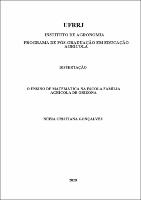Use este identificador para citar ou linkar para este item:
http://rima.ufrrj.br/jspui/handle/20.500.14407/12244| Tipo do documento: | Dissertação |
| Título: | O ensino de Matemática na Escola Família Agrícola de Orizona |
| Título(s) alternativo(s): | The mathematics teaching at Familia Agrícola de Orizona School |
| Autor(es): | Gonçalves, Núbia Cristiana |
| Orientador(a): | Mattos, José Roberto Linhares de |
| Primeiro membro da banca: | Mattos, José Roberto Linhares de |
| Segundo membro da banca: | Nascimento, Eulina Coutinho Silva do |
| Terceiro membro da banca: | Mattos, Sandra Maria Nascimento de |
| Quarto membro da banca: | Tostas, Rogério Gomes de Lima |
| Palavras-chave: | Ensino de matemática;Educação do Campo;Etnomatemática;Mathematics teaching;Rural Education;Ethnomathematics |
| Área(s) do CNPq: | Educação |
| Idioma: | por |
| Data do documento: | 31-ago-2020 |
| Editor: | Universidade Federal Rural do Rio de Janeiro |
| Sigla da instituição: | UFRRJ |
| Departamento: | Instituto de Agronomia |
| Programa: | Programa de Pós-Graduação em Educação Agrícola |
| Citação: | GONÇALVES, Núbia Cristiana. O ensino de matemática na Escola Família Agrícola de Orizona. 2020. 76 F. Dissertação (Mestrado em Educação Agrícola) - Instituto de Agronomia, Universidade Federal Rural do Rio de Janeiro, Seropédica, RJ. 2020. |
| Resumo: | Esta pesquisa foi desenvolvida no âmbito da educação do campo na Escola Família Agrícola de Orizona, no estado de Goiás, Brasil. Os sujeitos da pesquisa foram um professor de matemática e quatorze pais ou responsáveis (agricultores) dos alunos do Curso Técnico em Agropecuária de Nível Médio. Tendo como principal objetivo analisar a teoria e a prática no ensino de matemática na referida escola, com ênfase na interdisciplinaridade e na etnomatemática. Para isso examinou-se o currículo, foi descrito como ocorre o ensino da matemática, identificou-se os elementos da Etnomatemática com base no currículo e nos Temas Geradores predispostos no Plano de Formação e verificou-se a relação entre conhecimento escolarizado e os saberes rurais, na pedagogia da alternância. Como procedimento metodológico, optou-se por um estudo de caso com abordagem qualitativa, no qual empregou-se pesquisa bibliográfica, pesquisa documental, questionário e entrevistas semiestruturadas, como instrumentos para a produção dos dados. Os dados foram analisados através das orientações propostas na metodologia de análise de conteúdo. Os resultados apontaram para a importância da etnomatemática na educação do campo, assim sendo possível contextualizar o ensino de matemática voltado para a realidade dos alunos, aliando teoria e prática. Constatou-se, que os conhecimentos matemáticos (próprios e escolarizados) dos pais ou responsáveis são um complemento paralelo com os conhecimentos escolares dos filhos e o caráter interdisciplinar emerge da análise das falas dos pais ou responsáveis. Portanto, nota-se a possibilidade de articular os conhecimentos matemáticos (próprios e escolarizados) aos conhecimentos escolares, podendo ir além dos conhecimentos de outras áreas (nutrição animal, mecanização agrícola, etc). Por fim, concluiu-se que a matemática escolar não deve ser trabalhada de maneira isolada, sem relação com as situações cotidianas enfrentadas pelos alunos e interdisciplinaridade. Diante disso, a etnomatemática torna-se importante pelo fato de considerar os saberes e fazeres dos alunos, provenientes dos conhecimentos próprios dos pais, em interação com os novos conhecimentos matemáticos da escola. |
| Abstract: | This research was developed in the field of rural education at Família Agrícola de Orizona School, in Goiás state, Brazil. The people interviewed were a mathematics teacher and fourteen parents or guardians (farmers) of the students of the Technical Course in Agricultural High School. The main objective was to analyze the theory and practice in the teaching of mathematics at that school, with an emphasis on interdisciplinarity and ethnomathematics. For this, the curriculum was examined, the teaching of mathematics was described, the elements of Ethnomathematics were identified based on the curriculum and the Generating Themes predisposed in the Training Plan and the relationship between school knowledge and rural knowledge was verified, in the pedagogy of alternation. As a methodological procedure, a case study with a qualitative approach was chosen, in which bibliographic research, documentary research, questionnaire and semi-structured interviews were used as instruments for data production. The data were analyzed using the guidelines proposed in the content analysis methodology. The results pointed out to the importance of ethnomathematics in rural education, thus making it possible to contextualize the teaching of mathematics geared to the students' reality, combining theory and practice. It was found that the mathematical knowledge (own and schooled) of the parents or guardians is a parallel complement to the school knowledge of the children and the interdisciplinary character emerges from the analysis of the statements of the parents or guardians. Therefore, there is the possibility of articulating the own mathematical knowledges with school knowledges, being able to go beyond the knowledge of other areas (animal nutrition, agricultural mechanization etc.). Finally, it was concluded that school mathematics should not be worked in isolation, unrelated to the everyday situations faced by students and interdisciplinarity. Therefore, ethnomathematics becomes important since it considers students 'knowledge and practices, derived from the parents' own knowledge, in interaction with the new school mathematical knowledge. |
| URI: | https://rima.ufrrj.br/jspui/handle/20.500.14407/12244 |
| Aparece nas coleções: | Mestrado em Educação Agrícola |
Se for cadastrado no RIMA, poderá receber informações por email.
Se ainda não tem uma conta, cadastre-se aqui!
Arquivos associados a este item:
| Arquivo | Descrição | Tamanho | Formato | |
|---|---|---|---|---|
| 2020 - Núbia Cristiana Gonçalves.Pdf | 3,49 MB | Adobe PDF |  Abrir |
Os itens no repositório estão protegidos por copyright, com todos os direitos reservados, salvo quando é indicado o contrário.

